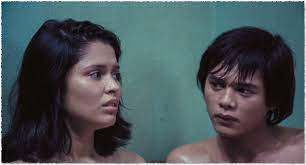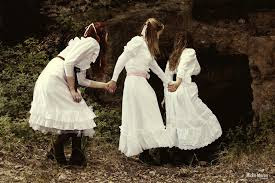Maynila: sa mga Kuko ng Liwanag
I do not
think I have ever watched a Filipino movie before but based in “Manila in the
Claws of Light” (“Maynila, sa mga Kuko ng Liwanag”), maybe I should track down
some more of those. “Manila in the Claws of Light” is an impressive and
powerful movie, but also a desperately depressive one.
We follow
Julio (Rafael Roco), a young fisherman who has recently arrived in Manilla,
looking for his girlfriend, Ligaya (Hilda Koronel). Slowly, we learn that
Ligaya left the fishing village with an older woman Mrs. Cruz, who where there
to find young (pretty) girls to “work in a factory”. Since then, nobody heard
from her, so Julio went to the city to find her.
He got
mugged upon arrival and earns a pitiful salary as a construction worker. Here he
befriends the other workers, but also witness the callousness of their
employers and the dangers of the work. In his search for Ligaya he learns of his
friend’s (Atong) random death due to police injustice, how that same friend’s
family was displaced from their farmland by criminal developers and how his widowed
wife now has to prostitute herself. Julio encounters (and has a brief career
as) male prostitution. He, himself, gets mugged by the police, and when he finally
finds Ligaya, she has been forced into prostitution and is now kept as a
prisoner sex slave by a Chinese. It is no surprise that this ends poorly for
everyone involved.
More than
being the story of Julio, this is an indictment of the city of Manila itself.
Julio is merely a random victim and witness to the corruption infesting the
city at every level. His fishing village is the happy Eden, always in bright
light, next to the grimy and dark squalor of Manila. There is an apathy and quiet
acceptance that everybody cheats, that you put up with injustice because you must
live and a little is better than nothing. The authorities offer no protection
but is indeed part of the problem. Life at the bottom is pretty shit in Manila.
The slum is disgusting, prostitution is rampant, and it is the jungle law at
every level.
Even the
innocent has to learn and become corrupt to survive, there is no other way.
Julio tries to hold it off, tries to believe the best in people, but his naivety,
endearing as it is, is constantly punished, until he himself snaps. It is
heartbreaking and painful, but completely without melodrama.
A major
difference with other social realistic or socially indignant movies I have been
subjected to lately, is that there are no stupid hillbillies here. This is not
about people too idiotic or miserable to understand their own predicament.
These are normal people who understand what is going on around them but is
powerless to do anything about it because the corruption is so rooted into everything
around them. It makes it so much easier to root for them and the message is so
much clearer and poignant to the viewer.
It is a
movie from 1975, supposedly taking please in 1970, but there is nothing here
that could not belong to a 21st century setting. I am not at all familiar
with the Philippines and Manila, I have only been there a single time and that
in a very protected environment, but I would be very surprised if this story is
not repeated on a daily basis in many of the world’s megacities.
In addition
to this powerful, if depressive, story, there is a surprising quality of the
movie itself. Again, I have no basis for judging Filipino cinema, but compared
to much of the other world cinema the List throws at me, this is very high
production value. The acting is very good, but the cinematography is just
amazing. There is literally no filter on how the darkness of the city is portrayed.
There is a lot of nerve to these images. Only minus is a slightly oppressive soundtrack.
It gets a bit tacky at times, as if the producer has watched a few too many
soft-porn movies.
This is a big
recommendation from me but brace yourself for a rough ride.




